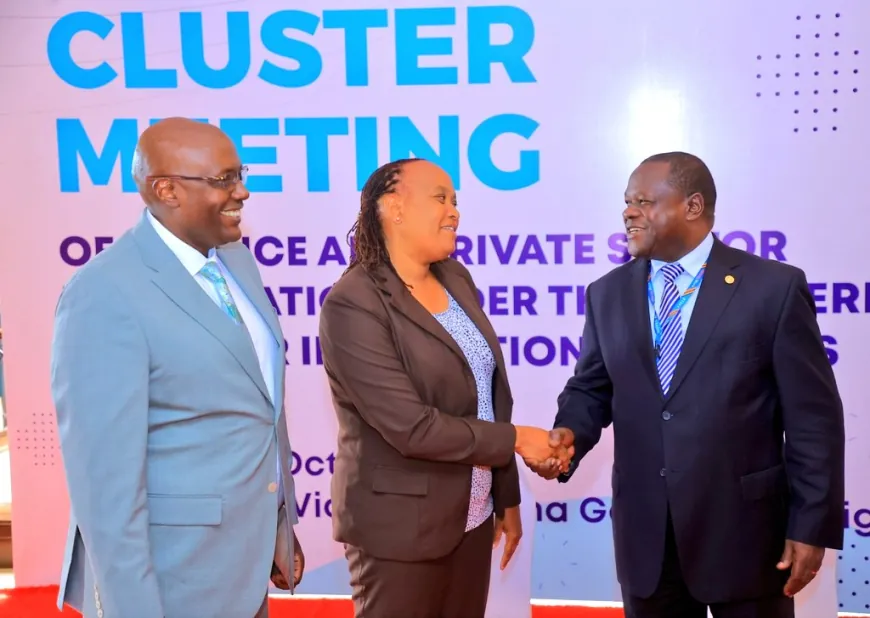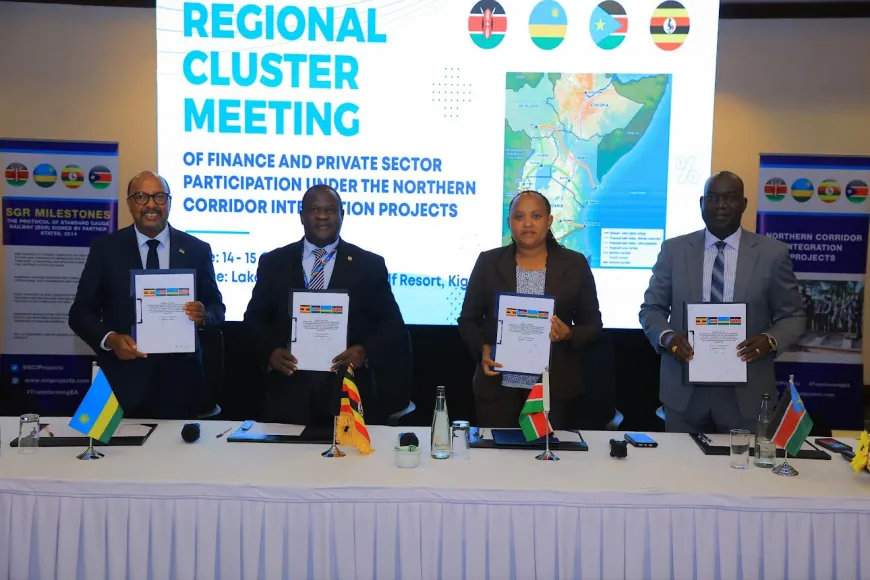Northern Corridor Integration Projects progressing: DST Ocalap tells partner states.

From 14th -15th October 2024, Northern Corridor partner states including Burundi, the Democratic Republic of Congo, Rwanda, Uganda and South Sudan among others held a meeting in Kampala.
This meeting marked a significant step towards achieving regional integration, private sector development, and financial collaboration, paving the way for a more integrated and prosperous Northern Corridor region.
The Deputy Secretary to the Treasury, Patrick Ocailap who represented Uganda's Finance Minister said that Northern Corridor Integration Projects is on the right direction, progressing on implementing of various projects in Uganda and the region.
While making his remarks during the regional cluster meeting of finance and private sector participation under the Northern Corridor Integration held at Serena Hotel in Kigo, DST Patrick Ocailap said that told the partner states that Uganda has registered progress on several directives under the Northern Corridor Integration Projects including signing of the construction agreement with the Turkish contractor and acquisition of the right of way for the Standard Gauge Railway (SGR) for the Eastern Route between Malaba and Kampala which now stands at 58% and signing of the civil works contract.
“There has been attainment of One Network Area since 2014 which enables flat rates for voice, data and SMS across partner states, approval of the National Payment System Act, 2020 to make inter-operability of mobile financial services among operator mandatory but also the establishment of a Project Preparation Facility (PPF) under the National Planning Authority to help in project preparation and structuring,” Ocailap said.
DST Ocailap encouraged partner states to ensure full implementation of the 14th Summit directives and cluster recommendations and that completion of civil works at Tanga for the EACOP project in underway.
“There has been the full contribution of Equity for the East African Crude Oil Pipeline (EACOP) project amounting to USD 376 million, 100% acquisition of right of way for the pipeline and completion of civil works of the terminal and jetty in Tanga. The EACOP has also received over 700 kilometers of line pipes from the supplier ready to be laid” he said
In addition, he said that under the refinery project, the Ugandan government has agreed with a private sector investor Alpha MBM Consortium from the United Arab Emirates to develop a 60,000 barrels of oil per day refinery in Hoima, Uganda.
“Negotiations are ongoing to conclude key commercial and legal agreements to enable implementation of the project.”
Representatives of Cabinet Ministers from the Northern Corridor Integration Projects approved and signed a crucial report prepared by Permanent/Principal Secretaries from their member countries.
The report focuses on the regional cluster meeting of finance and private sector participation, aiming to enhance economic collaboration and growth among member states.
The meeting, part of the Northern Corridor Integration Projects, brought together representatives of finance ministers from Kenya, Rwanda, South Sudan, and Uganda to discuss key financial and private sector issues.
The meeting also resolved to engage private sector apex bodies to mobilize funding for NCIP projects, addressing the high financing costs hindering project finalization.
Elizabeth Shungula, the head of the Kenyan delegation said, "The development of the refined petroleum products pipeline will be deliberated upon at the upcoming refined petroleum products pipeline cluster meeting in Nairobi.”
Rwanda's High Commissioner, Joseph Rutabana, emphasized the critical importance of implementing NCIPs. "Infrastructure development presents invaluable opportunities for economic growth and enhanced regional integration," he noted.
Rwanda's High Commissioner to Uganda, Joseph Rutabana, underscored the importance of implementing the NCIPs, emphasizing its critical role in regional economic growth and integration.
"Infrastructure development presents invaluable opportunities for economic growth and enhanced regional integration," Rutabana noted, highlighting the need for active participation in financing initiatives and private sector involvement.
Rutabana expressed gratitude to Uganda for hosting the NCIP meeting and reaffirmed Rwanda's commitment to collaborating with partner states on joint projects. Rwanda is set to host the 15th NCIP Summit, with dates to be announced after cluster meetings across all partner states.
Amb. Richard Kabonero, Uganda's National Coordinator of the Northern Corridor Integration Projects (NCIP), emphasizes the vital role of the private sector in driving regional economic growth. "Local companies participating in the East African Crude Oil Pipeline project and suppliers providing materials are shining examples of successful private sector engagement," Kabonero noted.
He cited the reduced call costs within the region, thanks to the One Network Area initiative, as a testament to the NCIP's effectiveness.













